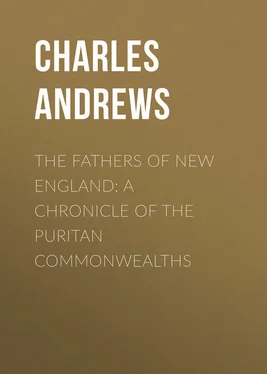Charles Andrews - The Fathers of New England - A Chronicle of the Puritan Commonwealths
Здесь есть возможность читать онлайн «Charles Andrews - The Fathers of New England - A Chronicle of the Puritan Commonwealths» — ознакомительный отрывок электронной книги совершенно бесплатно, а после прочтения отрывка купить полную версию. В некоторых случаях можно слушать аудио, скачать через торрент в формате fb2 и присутствует краткое содержание. Жанр: foreign_antique, foreign_prose, Историческая проза, на английском языке. Описание произведения, (предисловие) а так же отзывы посетителей доступны на портале библиотеки ЛибКат.
- Название:The Fathers of New England: A Chronicle of the Puritan Commonwealths
- Автор:
- Жанр:
- Год:неизвестен
- ISBN:нет данных
- Рейтинг книги:3 / 5. Голосов: 1
-
Избранное:Добавить в избранное
- Отзывы:
-
Ваша оценка:
- 60
- 1
- 2
- 3
- 4
- 5
The Fathers of New England: A Chronicle of the Puritan Commonwealths: краткое содержание, описание и аннотация
Предлагаем к чтению аннотацию, описание, краткое содержание или предисловие (зависит от того, что написал сам автор книги «The Fathers of New England: A Chronicle of the Puritan Commonwealths»). Если вы не нашли необходимую информацию о книге — напишите в комментариях, мы постараемся отыскать её.
The Fathers of New England: A Chronicle of the Puritan Commonwealths — читать онлайн ознакомительный отрывок
Ниже представлен текст книги, разбитый по страницам. Система сохранения места последней прочитанной страницы, позволяет с удобством читать онлайн бесплатно книгу «The Fathers of New England: A Chronicle of the Puritan Commonwealths», без необходимости каждый раз заново искать на чём Вы остановились. Поставьте закладку, и сможете в любой момент перейти на страницу, на которой закончили чтение.
Интервал:
Закладка:
This grant of territory to the Massachusetts Bay Company and of the charter confirming the title and conveying powers of government put a complete stop to Gorges's plans for a final proprietorship in New England. Gorges had acquiesced in the first grant by the New England Council because he thought it a sub-grant, like that to Plymouth, in no way injuring his own control. But when in 1632, he learned the true inwardness of the Massachusetts title and discovered that Warwick and the Puritans had outwitted him by obtaining royal confirmation of a grant that extinguished his own proprietary rights, he turned on Warwick, declared that the charter had been surreptitiously obtained, and demanded that it be brought to the Council board. Learning that it had gone to New England, he forced the withdrawal of Warwick from the Council, and from that time forward for five years bent all his efforts to overthrow the Puritan colony by obtaining the annulment of its privileges.
In this attempt, he was aided by Captain John Mason, an able, energetic promoter of colonizing movements who had already been concerned with settlements in Newfoundland and Nova Scotia, and who was zealous to begin a plantation in the province of Maine. Mason had received grants from the Council, both individually and in partnership with Gorges, and had visited New England in the interest of his claims. Through the influence of Gorges, he was now made a member of the Council and joined in the movement to break the hold of the Puritans upon New England. He and Gorges found useful allies in three men who had been driven out of Massachusetts by the Puritan leaders soon after their arrival at Boston – Thomas Morton of Merrymount, Sir Christopher Gardiner, a picturesque, somewhat mysterious personage thought to have been an agent of Gorges in New England, with methods and morals that gave offense to Massachusetts, and Philip Ratcliffe, a much less worthy character given to scandal and invective, who had been deprived of his ears by the Puritan authorities. These men were bitter in their denunciation of the Puritan government.
The situation was perilous for the new colony, which was hardly yet firmly established. In direct violation of the royal commands, hundreds of men and women were leaving England – not merely adventurers or humble Separatists, but sober people of the better classes, of mature years and substantial characters. When, therefore, Gorges and the others meeting at Gorges's house at Plymouth brought their complaints to the attention of the Privy Council, they were listened to with attention, and instructions were sent at once to stop the Puritan ships and to bring the charter of the Massachusetts Company to the Council board. To check the Puritan migration and to institute further inquiry into the facts of the case a commission was appointed in 1634, with Archbishop Laud at its head, for the special purpose, among others, of revoking charters "surreptitiously and unduly obtained." Gorges and Morton appealed to Laud against the Puritans, and Morton wrote his New England Canaan , which he dedicated to Laud, in the hope of exposing the motives of the colony and of arousing the Archbishop to action. Warwick threw his influence on the side of Massachusetts, being always forward, as Winthrop said, "to do good to our colony"; and the colony itself, fearing attack, began to fortify Castle Island in the harbor and to prepare for defense. Endecott, in wrath, defaced the royal ensign at Salem, and so intense was the excitement and so determined the attitude of the Puritans that, had the Crown attempted to send over a Governor-General or to seize the charter by force, the colony would have resisted to the full extent of its power.
Gorges, believing that he could work better through the King and the Archbishop than through the New England Council, brought about the dissolution of that body in 1635, thus making it possible for the King to deal directly with the New England situation. Before its dissolution the Council had authorized Morton, acting as its lawyer, to bring the case to the attention of the Attorney-General of England, who filed in the Court of King's Bench a complaint against Massachusetts, as a result of which a writ of quo warranto was issued against the Company.
The outlook was ominous for Puritanism, not only in New England but in old England as well. That year saw the flight of the greatest number of emigrants across the sea, for the persecution in England was at its height, the Puritan aristocracy was suffering in its estates, and Puritan divines were everywhere silenced or dismissed. Even Warwick was shorn of a part of his power. Young Henry Vane, son of a baronet, had already gone to America, and such men as Lord Saye and Sele, Lord Brooke, and Sir Arthur Haslerigg were thinking of migrating and had prepared a refuge at Saybrook where they might find peace. But the turn of the tide soon came. The royal Government was bankrupt, the resistance to the payment of ship-money was already making itself felt, and disturbances in the central and eastern counties were absorbing the attention and energies of the Government. Gorges, left alone to execute the writ against the colony, joined with Mason in building a ship for the purpose of carrying the quo warranto to New England, but the vessel broke in the launching, and their resources were at an end. Mason died in 1635, and Gorges, an old man of seventy, bankrupt and discouraged, could do no more. Though Morton continued the struggle, and though, in 1638, the Committee of the Council for Foreign Plantations (the Laud Commission) again demanded the charter, the danger was past: conditions in England had become so serious for the King that the complaints against Massachusetts were lost to view. At last in 1639 Gorges obtained his charter for a feudal propriety in Maine but no further attempts were made to overthrow the Massachusetts Bay colony.
During the years from 1630 to 1640, the growth of the colony was extraordinarily rapid. In the first year alone seventeen ships with two thousand colonists came over, and it is estimated that by 1641 three hundred vessels bearing twenty thousand passengers had crossed the Atlantic. It was a great migration. Inevitably many went back, but the great majority remained and settled in Boston and its neighborhood – Roxbury, Charlestown, Dorchester, Cambridge, and Watertown, where in 1643 were situated according to Winthrop "near half of the commonwealth for number of people and substance." From the first the colonists dispersed rapidly, establishing in favorable places settlements which they generally called plantations but sometimes towns. In these they lived as petty religious and civil communities, each under its minister, with civil officials chosen from among themselves. In the decade following 1630 the number of such settlements rose to twenty-two. The inhabitants were almost purely English in stock, with here and there an Irishman, a few Jews, and an occasional negro from the West Indies. Nearly all the settlers were of Puritan sympathies, and of middle-class origin – tenants from English estates, artisans from English towns, and many indentured servants. A few were of the aristocracy, such as Lady Arabella Johnson, daughter of the Earl of Lincoln, Sir Richard Saltonstall, Lady Deborah Moody, members of the Harlakenden family, young Henry Vane, Thomas Gorges, and a few others. Of "Misters" and "Esquires" there was a goodly number, such as Winthrop, Haynes, Emanuel Downing, and the like. The first leaders were exceptional men, possessed of ability and education, and many were university graduates, who brought with them the books and the habits of the reader and scholar of their day. They were superior to those of the second and third generation in the breadth of their ideas and in the vigor and originality of their convictions.
Читать дальшеИнтервал:
Закладка:
Похожие книги на «The Fathers of New England: A Chronicle of the Puritan Commonwealths»
Представляем Вашему вниманию похожие книги на «The Fathers of New England: A Chronicle of the Puritan Commonwealths» списком для выбора. Мы отобрали схожую по названию и смыслу литературу в надежде предоставить читателям больше вариантов отыскать новые, интересные, ещё непрочитанные произведения.
Обсуждение, отзывы о книге «The Fathers of New England: A Chronicle of the Puritan Commonwealths» и просто собственные мнения читателей. Оставьте ваши комментарии, напишите, что Вы думаете о произведении, его смысле или главных героях. Укажите что конкретно понравилось, а что нет, и почему Вы так считаете.












